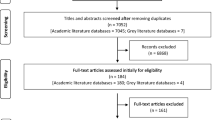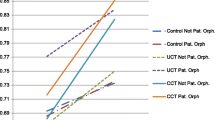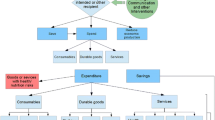Abstract
Limited evidence exists of the effectiveness of combining cash transfers and family strengthening interventions in developing country contexts. This study provides evidence from an evaluation of a bespoke family strengthening intervention for Child Support Grant beneficiaries in 10 urban communities in Johannesburg, South Africa. A qualitative pre-post design was used to assess the effectiveness of this combination intervention including a nine-month follow-up study. Participants were randomly assigned to intervention and non-intervention groups allowing for comparison between the groups over time. The intervention improved child-caregiver and family relations; strengthened networks of social support and caregiver engagement in schooling and enhanced parenting and financial capabilities. Findings were inconclusive in improving symptoms of depression and in nutritional knowledge and skills. Combination interventions of this kind have the potential to improve child and family well-being in certain domains.
Similar content being viewed by others
References
Agüero, J. M., Carter, M. R., & Woolard, I. (2007). The impact of the unconditional cash transfers on nutrition: The South African Child Support Grant: Working Paper 39. Brazil: International Poverty Centre, United Nations Development Programme.
Arriagada, A., Perry, J., Rawlings, L., Trias, J., & Zumaeta, M. (2018). Promoting early childhood development through combining cash transfers and parenting programs. Washington, DC: World Bank Group Social Protection and Jobs Global Practice.
Bagstagli, F., Hagen-Zanker, J., Harman, L., Barca, V., Sturge, G., & Schmidt, T. (2016). Cash transfers: What does the evidence say? A rigorous review of programme impact and the role of design and implementation features. London: Overseas Development Institute.
Baluch, B., Duffy, L. J., Badami, R., & Pereira, E. C. (2017). A cross-continental study on children’s drawings of football players: Implications for understanding key issues and controversies in human figure drawings. Europe’s Journal of Psychology, 13(3), 455–471.
Banerjee, A., Duflo, E., Glennerster, R., & Kinnan, C. (2015). The miracle of microfinance? Evidence from a randomized evaluation. American Economic Journal: Applied Economics, 7(1), 22–53.
Baron, E. C., Davies, T., & Lund, C. (2017). Validation of the 10-item Centre for Epidemiological Studies Depression Scale (CES-D-10) in Zulu, Xhosa and Afrikaans populations in South Africa. BMC Psychiatry, 17(1), 6.
Barrientos, A. (2013). Social assistance in developing countries. Cambridge: Cambridge University Press.
Betts, D. (2013). A review of the principles for culturally appropriate art therapy assessment tools. Art Therapy, 30(3), 98–106.
Black, M. (2012). Household food insecurities: Threats to children’s well-being. SES Indicator. https://www.apa.org/pi/ses/resources/indicator/2012/06/household-food-insecurities.
Bogenschneider, K., Little, O. M., Ooms, T., Benning, S., Cadigan, K., & Corbett, T. (2012). The family impact lens: A family-focused, evidence-informed approach to policy and practice. Family Relations, 61, 514–531.
Britto, P. R., Ponguta, L. A., Reyes, C., & Karnati, R. (2015). A systematic review of parenting programmes for young children in low and middle income countries. UNICEF
Bronfenbrenner, U. (1979). The ecology of human development. Harvard: Harvard University.
Cluver, L. D., Meinck, F., Shenderovich, Y., Ward, K. L., Romero, R. H., Redfern, A., … Lechowicz, M. (2016). A parenting programme to prevent abuse of adolescents in South Africa: Study protocol for randomised controlled trials. Trials, 17, 1–10.
Cluver, L. D., Meinck, F., Steinert, J. I., Shenderovich, Y., Doubt, J., Romero, R. H., … Gardner, F. (2018). Parenting for lifelong health: A pragmatic cluster randomised controlled trial of a non-commercialised parenting programme for adolescents and their families in South Africa. BMJ Global Health, 3, e000539.
Cobb, S. (1976). Social support as a moderator of life stress. Psychosomatic Medicine, 38(5), 300–314.
Crawford, E., Gross, J., Patterson, T., & Hayne, H. (2012). Does children’s colour use reflect the emotional content of their drawings? Infant and Child Development, 21(2), 198–215.
Department of Education. (2006). South African Schools act, 1996 (act no 84 of 1996). South Africa Government Gazette: Amended national norms and standards for school funding.
Department of Planning, Monitoring and Evaluation, Statistics South Africa and The World Bank. (2018). Overcoming poverty and inequality in South Africa: An assessment of drivers, constraints and opportunities. Washington: International Bank for Reconstruction, Development/the World Bank. https://www.dpme.gov.za/publications/Reports%20and%20Other%20Information%20Products/World%20Bank%20Report%202018.pdf.
DSD, SASSA, & UNICEF. (2012). The South African Child Support Grant impact assessment: Evidence from a survey of children, adolescents and their households. UNICEF South Africa.
DSD, SASSA, & UNICEF. (2016). Removing barriers to accessing Child Grants: Progress in reducing exclusion from South Africa’s Child Support Grant. UNICEF South Africa.
Dunn, J., O’Connor, T. G., & Levy, I. (2002). Out of the picture: A study of family drawings by children from step, single-parent, and non-step families. Journal of Clinical and Adolescent Psychology, 31(4), 505–512.
Gardner, F., Montgomery, P., & Knerr, W. (2016). Transporting evidence-based parenting programs for child problem behavior (age 3-10) between countries: Systematic review and meta-analysis. Journal of Clinical Child Adolescent Psychology, 45(6), 749–762.
Gerhardt, A., Keller, H., & Rübeling, H. (2016). Children’s family drawings as expressions of attachment representations across cultures: Possibilities and limitation. Child Development, 87(4), 1069–1078.
Gorman-Smith, D., Tolan, P., Henry, D. B., Quintana, E., Lutovsky, K., & Leventhal, A. (2007). Schools and families educating children: A preventive intervention for early elementary school children. In P. Tolan, J. Szapocznik & S. Sambrano (Eds.), Preventing youth substance abuse: Science-based programs for children and adolescents. (pp. 113–135). American Psychological Association.
Haghighi, M., Khaterizadeh, M., Chalbianloo, G., Toobaei, S., & Ghanizadeh, A. (2014). Comparing the drawings of children with Attention Deficit Hyperactivity Disorder with normal children. Iran Journal of Psychiatry, 9(4), 222–227.
Hall, K., Richter, L., Mkowane, Z., & Lake, L. (Eds.). (2018). South African Child Gauge 2018. Cape Town: Children’s Institute, University of Cape Town.
Heckman, J. (2008). Schools, skills and synapses. Economic Enquiry, 46(3), 289–324.
Hochfeld, T., Chiba, J., & Patel, L. (2020). Sihleng’imizi: The nature of care in poor families in South Africa. In N. Mkhwanazi & L. Manderson (Eds.), Connected lives: Families, households, health and care in contemporary South Africa. Cape Town: HSRC Press.
Koppitz, E. M. (1968). Psychological evaluation of human figure drawings. New York: Grune & Stratton.
Lloyd-Jones, G. (2003). Design and control issues in qualitative case study research. International Journal of Qualitative Methods, 2(2), 33–42.
Lowenfeld, V., & Britain, W. L. (1970). Creative and mental growth (5th ed.). Macmillan: New York.
Makusha, T., Richter, L., Naicker, S., Swartz, C., & Desmond, C. (2019). Regarding baba: Perceptions about fathers and fatherhood in South Africa. In Z. Mokomane, B. Roberts, J. Struwig, & S. Gordon (Eds.), South African social attitudes: Family matters: family cohesion, values and strengthening to promote wellbeing. Cape Town: HSRC Press.
Meinck, F., Cluver, L. D., Boyes, M. E., & Mhlongo, E. L. (2015). Risk and protective factors for physical and sexual abuse of children and adolescents in Africa: A review and implications for practice. Trauma, Violence & Abuse, 16(1), 81–107.
Minkkinen, J. (2013). The structural model of child well-being. Child Indicators Research, 6(3), 1–13.
Patel, L. (2015). Social welfare and social development (2nd ed.). Oxford: Oxford University Press.
Patel, L., Hochfeld, T., & Chiba, J. (2019). Perspectives of South African caregivers in receipt of Child Support Grants: Implications for family strengthening interventions. International Journal of Social Welfare, 28, 307–317.
Patel, L., Knijn, T., Gorman-Smith, D., Hochfeld, T., Isserow, M., Garthe, R., … Kgaphola, I. (2017). Family contexts, child support grants and child well-being in South Africa. Johannesburg: University of Johannesburg.
Patel, L., Knijn, T., & van Wel, F. (2015). Child support grants in South Africa: A pathway to women’s empowerment and child well-being? Journal of Social Policy, 44(2), 377–397.
Plagerson, S., Patel, V., Harpham, T., Kielmann, K., & Mathee, A. (2014). Does money matter for mental health? Evidence from the Child Support Grants in Johannesburg, South Africa. Global Public Health, 6(7), 760–776.
Pollard, E. L., & Lee, P. D. (2003). Child well-being: A systematic review of the literature. Social Indicators Research, 61(1), 59–78.
Radloff, L.S. (1977). CES-D scale: A self-report depression scale for research in the general populations. Applied Psychological Measurement, 1, 385–401.
Richter, L. M., Mathews, S., Kagura, J., & Nonterah, E. (2018). A longitudinal perspective on violence in the lives of South African children from the birth to twenty plus cohort study in Johannesburg-Soweto. The South African Medical Journal, 108(3), 181–186.
Roelen, K., Delap, E., Jones, C., & Karki Chettri, H. (2017). Improving child well-being and care in Sub-Saharan Africa: The role of social protection. Children and Youth Service Review, 73, 309–318.
Roelen, K., Devereux, S., Abdulai, A., Martorano, B., Palermo, T., & Ragno, I. P. (2018). How to make ‘cash plus’ work: Linking cash transfers with services and sectors. Innocenti Working Paper 2017-10. UNICEF.
Rosenberg, M., Pettifor, A., Twine, R., Hughes, J. P., Gomez-Olive, X., Wagner, R. G., … Kahn, K. (2018). Evidence for sample selection effect and Hawthorne effect in behavioural HIV prevention trial among young women in a rural South African community. British Medical Journal Open, 8, e019167.
September, R., & Savahl, S. (2009). Children’s perspectives on child well-being. The Social Work Practitioner, 21(1), 23–40.
Sherraden, M. (2013). Building blocks of financial capability. In J. Birkenmaaier, M. Sherraden, & J. Curely (Eds.), Financial capability and asset development: Research, education, policy and practice. Oxford: Oxford University Press.
Smokowski, P., Corona, R., Bacallao, M., Fortson, B. L., Marshall, K. J., & Yaros, A. (2018). Journal of Child and Family Studies, 27(9), 2925. https://doi.org/10.1007/s10826-018-1139-8.
Tolan, P. H., Gorman-Smith, D., & Henry, D. (2004). Supporting families in a high-risk setting: Proximal effects of the SAFE children preventive intervention. Journal of Consulting and Clinical Psychology, 72(5), 855–869.
Tolan, P. H., Guerra, N. G., & Kendall, P. C. (1995). A development ecological perspective in anti-social behavior in children and adolescents: Towards a unified risk and intervention framework. Journal of Consulting and Clinical Psychology, 63(4), 579–584.
Townsend, L., & De la Rey, C. (2008). Research methods in psychology. In L. Swartz, C. De la Rey, N. Duncan, & L. Townsend (Eds.), Psychology: An introduction (2nd ed., pp. 19–42). Oxford: Oxford University Press.
UNICEF. (2015). Cash transfers as a social protection intervention: Evidence from UNICEF Evaluations 2010-2-14. United Nations Children’s Fund. https://www.unicef.org/evaluation/files/Social_Protection_Evaluation_Synthesis_Final.pdf.
Wright, G., Ntshongwana, P., Noble, M., & Neves, D. (2019). Lone mothers’ accounts of the impact of poverty on their dignity: A South African perspective. In Z. Mokomane, B. Roberts, J. Struwig, & S. Gordon (Eds.), South African social attitudes: Family matters: Family cohesion, values and strengthening to promote wellbeing. Cape Town: HSRC Press.
Acknowledgements
We wish to dedicate this article to the memory of the late Professor Tessa Hochfeld who made a significant contribution to this study.
Funding
This intervention research was funded by the National Research Foundation (NRF), through the DST/NRF South Africa Research Chair in Welfare and Social Development; the University of Johannesburg; the City of Johannesburg (CoJ); and UNICEF South Africa. Opinions expressed and conclusions arrived at are those of the authors and do not necessarily reflect the views of the funders.
Author information
Authors and Affiliations
Corresponding author
Additional information
Publisher's Note
Springer Nature remains neutral with regard to jurisdictional claims in published maps and institutional affiliations.
Rights and permissions
About this article
Cite this article
Patel, L., Ross, E. Connecting Cash Transfers with Care for Better Child and Family Well-Being: Evidence from a Qualitative Evaluation in South Africa. Child Adolesc Soc Work J 39, 195–207 (2022). https://doi.org/10.1007/s10560-020-00714-z
Accepted:
Published:
Issue Date:
DOI: https://doi.org/10.1007/s10560-020-00714-z




